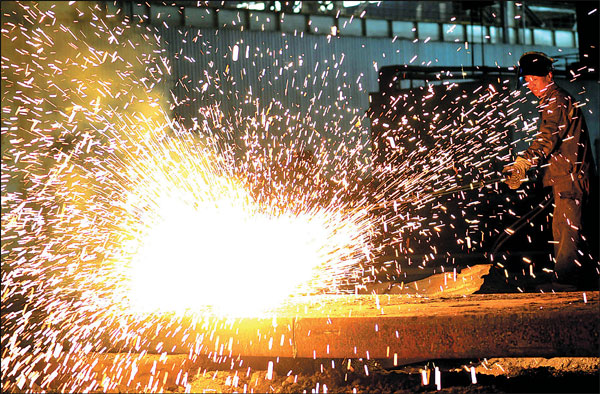
A worker oversees production at a plant of HBIS Group Hansteel Co in Handan in North China's Hebei province. [Photo/Xinhua]
Chinese steelmaker HBIS Group agreed to buy 70 percent of Indian conglomerate Tata Steel's projects in Southeast Asian countries on Monday, which is considered a "smart move" to invest in this regional market by experts.
HBIS, the world's third-largest steelmaker by output, which is based in Hebei province, will take over Tata Steel's projects in Singapore, Thailand, Vietnam and Malaysia, in order to maximize opportunities in the region on technology, channels and management.
The company didn't disclose the detailed investment scale of the projects.
Yu Yong, president of the group, said the company has seized the strategic opportunities in the steel industry's recapitalization in recent years to implement its global arrangement.
"Through the talks, we found that HBIS and Tata Steel share the same view on the world steel industry's future, which is the foundation of our cooperation."
It's not the first time that HBIS stepped into the overseas market through capital investment. In April 2016, HBIS spent 46 million euros ($52.5 million) to buy a steel factory in Serbia and realized a profit in several months.
President Xi Jinping visited the steel factory in June 2016, saying that the project will bring jobs to the local community and improve the local's living standards by reviving the steel factory.
HBIS will seize the opportunities offered by the growing steel demand in Southeast Asia, Yu said.
Xu Xiangchun, information director and analyst with iron and steel industry consultancy mysteel.com, said Southeast Asia has been a popular destination for steel investment in recent years because of the large population and its fast economic growth.
"It's one of the fastest growing markets in the world," Xu said. "However, building new steel production capacity may lead to oversupply risks since steel players in China, Japan and South Korea are all investing actively in the region. Plus, it will take much longer time."
"Thus, to enter the market through acquisition is effective and smart."
According to mysteel.com, the steel shortage in Southeast Asia is around 100 million metric tons annually, and the region depends on imports.
Xu added that due to the global oversupply in steel industry, there is a possibility that Southeast Asia can be affected by fast increasing investment.
Cheng Binhong, deputy general manager of the Industrial and Commercial Bank of China's Investment Banking Department, said during the signing ceremony that as world-level steel companies, HBIS and Tata Steel have a major role in the different regions.
TV Narendran, chief executive officer and managing director of Tata Steel, said he is confident that the steel projects in Southeast Asia will continue to grow in the future after the investment.
"Tata Steel shares the same culture with HBIS and we will explore more cooperative possibilities in future," he said.
Late last year, he told the media that the first half of 2019 will be a strong period for the steel industry globally.




































